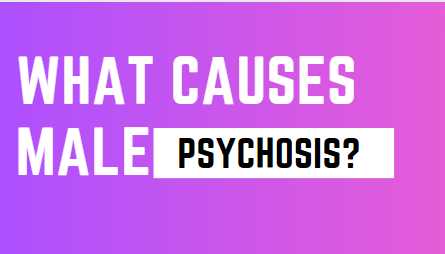What Causes Male Psychosis?
Male psychosis is a mental health condition that affects many men worldwide. This article explores the possible causes of male psychosis and provides valuable insights into its management and treatment.
Defining male psychosis
Male psychosis is a serious mental health condition that affects many men worldwide. It is a type of psychotic disorder that alters a person’s thinking, emotions, and behavior. Male psychosis is characterized by symptoms such as delusions, hallucinations, and disorganized thinking and speech.
Importance of discussing male psychosis
Mental health is a crucial aspect of a person’s overall well-being. However, due to the stigma surrounding mental illness, many men may not seek help when experiencing symptoms of male psychosis. Discussing male psychosis openly and honestly can help break down this stigma and encourage men to seek the help they need.
A brief overview of the article
This article explores the possible causes of male psychosis, including genetic and environmental factors, substance abuse, trauma, and medical conditions. It also discusses the symptoms of male psychosis, as well as treatment options and strategies for prevention and management.
Causes of male psychosis:
Genetic factors: Research has shown that genetics play a role in the development of male psychosis. Men who have a family history of psychotic disorders are at a higher risk of developing the condition themselves. Certain genes may also increase a person’s susceptibility to environmental factors that can trigger male psychosis.
Environmental factors
Environmental factors such as stress, trauma, and substance abuse can also contribute to the development of male psychosis. High levels of stress and trauma can trigger psychotic symptoms in vulnerable individuals. Substance abuse, particularly the use of drugs such as marijuana and hallucinogens, can also increase the risk of developing male psychosis.
Substance abuse
Substance abuse is a significant risk factor for male psychosis. Drugs such as marijuana and hallucinogens can cause psychotic symptoms, especially in individuals who are already susceptible to the condition. Long-term alcohol abuse can also lead to psychotic symptoms and other mental health issues.
Trauma and stress
Trauma and stress can trigger psychotic symptoms in vulnerable individuals. Traumatic events such as physical or sexual abuse, neglect, or violence can increase the risk of developing male psychosis. High levels of stress, such as those experienced in a demanding job or a difficult relationship, can also contribute to the development of the condition.
Medical conditions
Certain medical conditions, such as brain tumors or infections, can cause male psychosis. Hormonal imbalances, such as those caused by thyroid problems, can also contribute to the development of the condition.
Hormonal imbalances
Hormonal imbalances can affect a person’s mental health, and male psychosis is no exception. Testosterone levels can affect a man’s mood, behavior, and cognition. Low testosterone levels have been linked to an increased risk of developing male psychosis, although more research is needed to fully understand this connection.
Symptoms of male psychosis
Delusions are false beliefs that are not based on reality. Men with male psychosis may believe that they are being persecuted, spied on, or controlled by others. They may also experience delusions of grandeur, believing that they have special powers or abilities.
Hallucinations
Hallucinations are sensory experiences that are not based on reality. Men with male psychosis may experience auditory hallucinations, hearing voices or sounds that are not there. They may also experience visual hallucinations, seeing things that are not present.
Disorganized thinking and speech
Men with male psychosis may experience disorganized thinking and speech. Their thoughts and speech may be jumbled and illogical, making it difficult for others to understand them. They may also have trouble organizing their thoughts and expressing themselves clearly.
Abnormal motor behavior
Men with male psychosis may exhibit abnormal motor behavior, such as repeating movements or gestures, pacing, or standing in unusual positions. They may also exhibit stereotyped behaviors, such as repeating phrases or actions over and over again.
Negative symptoms
Negative symptoms of male psychosis refer to a loss of normal functions or behaviors. Men with male psychosis may exhibit a lack of emotion or motivation, decreased social engagement, or a loss of interest in activities they once enjoyed.
Cognitive deficits
Men with male psychosis may experience cognitive deficits, such as difficulties with memory, attention, and problem-solving. They may also have trouble with decision-making and planning.
Treatment options for male psychosis:
Medications
Antipsychotic medications are the primary treatment for male psychosis. These medications can help reduce the severity of psychotic symptoms and improve overall functioning. However, they can also cause side effects, such as weight gain and sedation.
Therapy
Therapy, such as cognitive-behavioral therapy (CBT), can be helpful for men with male psychosis. CBT can help individuals identify and challenge negative thought patterns, as well as develop coping strategies for managing symptoms.
Hospitalization
In severe cases, hospitalization may be necessary to manage psychotic symptoms and keep the individual safe. Hospitalization can provide a safe and supportive environment for individuals with male psychosis to receive treatment.
Electroconvulsive therapy (ECT)
Electroconvulsive therapy (ECT) may be recommended for individuals with severe male psychosis who do not respond to other treatments. ECT involves administering a small electric current to the brain, which can help alleviate symptoms of male psychosis.
Lifestyle changes
Making lifestyle changes, such as getting regular exercise, eating a healthy diet, and avoiding substance abuse, can also be helpful for men with male psychosis. These changes can improve overall health and reduce the severity of psychotic symptoms.
Prevention and management of male psychosis
Early detection and treatment
Early detection and treatment are essential for preventing the development of male psychosis. Seeking professional help as soon as symptoms appear can improve outcomes and prevent the condition from worsening.
Managing stress and trauma
Managing stress and trauma can also help prevent the development of male psychosis. Seeking support from friends and family, engaging in relaxation techniques such as meditation or yoga, and practicing self-care can all be helpful strategies for managing stress and trauma.
Avoiding substance abuse
Avoiding substance abuse is an important strategy for preventing the development of male psychosis. Men who are at risk for the condition should avoid using drugs such as marijuana and hallucinogens, which can increase the risk of developing psychotic symptoms.
Maintaining a healthy lifestyle
Maintaining a healthy lifestyle, including regular exercise, a healthy diet, and adequate sleep, can also be helpful in preventing the development of male psychosis. These lifestyle changes can improve overall health and reduce the risk of developing mental health issues.
Support from family and friends
Having support from family and friends can also be helpful for managing male psychosis. Supportive relationships can provide emotional support and practical assistance and can help individuals with male psychosis feel less isolated and alone.
Conclusion
Summary of the main points
Male psychosis is a serious mental health condition that can have a significant impact on a man’s life. It can be caused by a variety of factors, including genetics, environmental factors, substance abuse, trauma, medical conditions, and hormonal imbalances. Symptoms of male psychosis can include delusions, hallucinations, disorganized thinking and speech, abnormal motor behavior, negative symptoms, and cognitive deficits.
Treatment options for male psychosis include medications, therapy, hospitalization, electroconvulsive therapy, and lifestyle changes. Preventing and managing male psychosis involves early detection and treatment, managing stress and trauma, avoiding substance abuse, maintaining a healthy lifestyle, and having support from family and friends.
Emphasis on the importance of seeking professional help
It is important for men who are experiencing symptoms of male psychosis to seek professional help. Mental health professionals can provide a diagnosis and develop a treatment plan that is tailored to the individual’s specific needs.
Encouragement to spread awareness about male psychosis
Spreading awareness about male psychosis can help reduce the stigma surrounding mental illness and encourage men to seek the help they need. By discussing male psychosis openly and honestly, we can help break down barriers and ensure that men receive the support and treatment they need to live healthy, fulfilling lives.
In conclusion, male psychosis is a serious mental health condition that affects many men worldwide. It is important to understand the possible causes of male psychosis and to seek professional help if symptoms are experienced. Treatment options include medications, therapy, hospitalization, electroconvulsive therapy, and lifestyle changes.
Prevention and management involve early detection and treatment, managing stress and trauma, avoiding substance abuse, maintaining a healthy lifestyle, and having support from family and friends. Spreading awareness about male psychosis is also important in reducing the stigma surrounding mental illness and encouraging men to seek help. By taking these steps, we can work towards a society that is more understanding and supportive of those living with mental health conditions.






